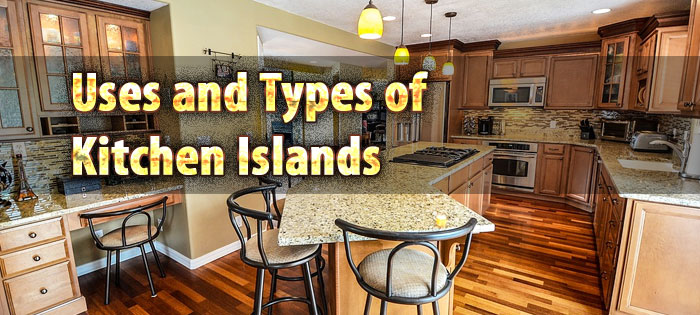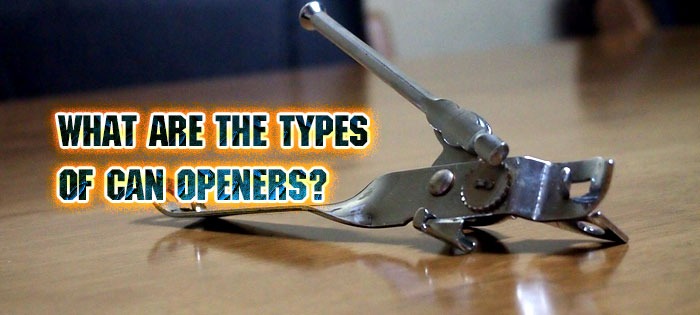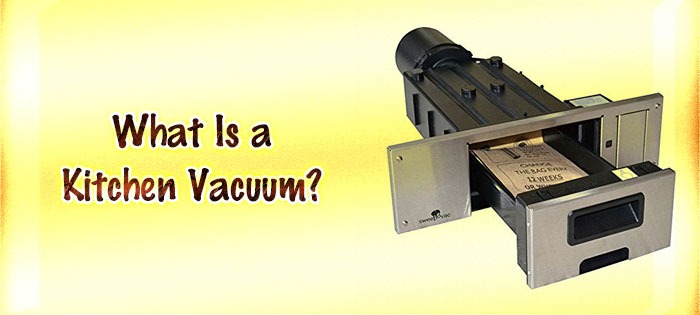What Is Smart Kitchen Technology?

Smart kitchen technology modifies your traditional cooking space into an intelligent, connected hub where appliances communicate and work together. You'll find Wi-Fi-enabled refrigerators that track food freshness, AI-powered ovens that guide your cooking, and voice-controlled faucets that dispense precise amounts of water. These smart appliances help reduce energy costs, prevent food waste, and enhance safety through remote monitoring and automatic shut-off features. With smartphone connectivity, you can control your kitchen from anywhere, receive maintenance alerts, and access recipe suggestions. The future of cooking holds even more revolutionary features to investigate.
Understanding The Smart Kitchen Concept
Intelligence meets culinary innovation in today's smart kitchen environment. When you're looking to modernize your kitchen space, smart kitchen technology transforms traditional cooking areas into connected hubs where your appliances communicate and work together seamlessly. Through Wi-Fi and Bluetooth connectivity, smart kitchen appliances become part of your smart home ecosystem, offering unparalleled control and monitoring capabilities.
You'll find that smart kitchen brands are revolutionizing everyday tasks with features like voice-activated controls and remote operation. Your smart oven can alert you when food is ready, while your smart refrigerator tracks inventory and suggests recipes based on available ingredients. Smart coffee makers can brew your morning cup precisely when you wake up, programmed right from your smartphone.
The Internet of Things (IoT) integration means your smart appliances can share data and automate routine tasks. You're able to monitor temperatures, adjust settings, and receive maintenance alerts from anywhere. This connectivity doesn't just offer convenience - it enhances safety, reduces energy consumption, and provides useful insights into your kitchen's operation through automated recordkeeping and performance tracking.
Essential Smart Kitchen Equipment
Every modern smart kitchen relies on a core set of connected equipment to function effectively. Smart appliances form the backbone of your connected kitchen, offering features that enhance cooking precision and convenience. You'll find smart countertop ovens with guided cooking capabilities that adjust temperature control automatically, while smart fridges help with inventory management through built-in cameras and barcode scanning.
Smart kitchen technology extends beyond major appliances to include essential connected devices that make cooking easier and safer. You'll benefit from Wi-Fi-enabled combi ovens, smart grills with meat probes, and intelligent coffee makers that track usage patterns.
- Smart refrigerators monitor food freshness and send expiration alerts to reduce waste
- AI-powered ovens provide step-by-step guidance for complex recipes
- Connected faucets offer precise water dispensing and voice control
- Smart smoke detectors and leak sensors guarantee kitchen safety
- Bluetooth-enabled small appliances like blenders sync with recipe apps
These integrated technologies work together to create an efficient cooking environment where you can control multiple devices remotely, maintain accurate temperature settings, and receive real-time alerts about your kitchen's status and inventory levels.
IoT Integration For Modern Kitchens
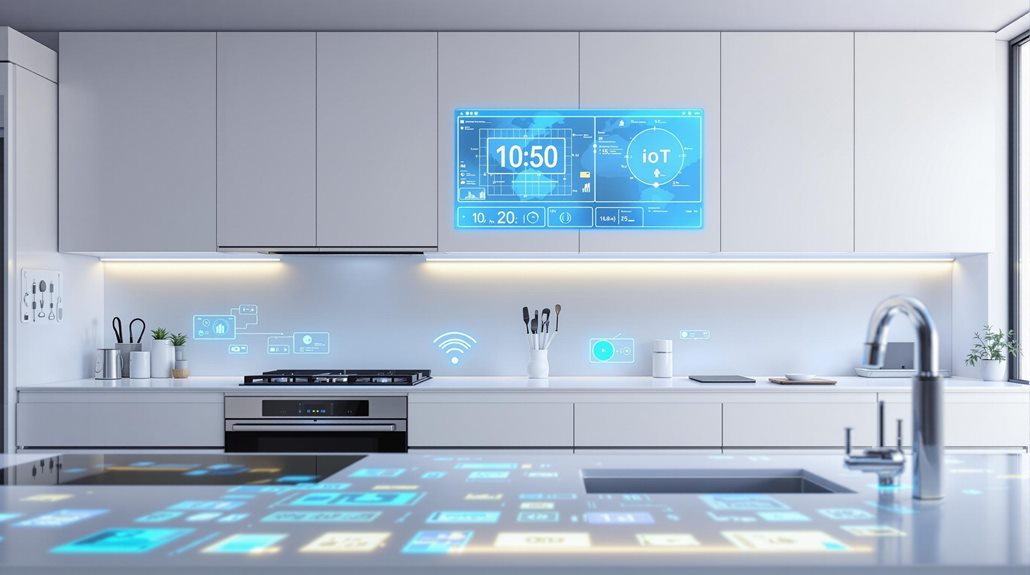
Modern kitchens thrive on seamless IoT integration, where your appliances and devices work together through an interconnected digital ecosystem. With Wi-Fi connectivity, you can control your kitchen appliances remotely through your smartphone, monitoring temperatures, adjusting settings, and receiving alerts about potential issues.
Smart technology changes how home cooks interact with their cooking devices. Your connected devices can detect food properties, recommend recipes based on available ingredients, and automatically adjust cooking settings for ideal results. Smart kitchens also help prevent accidents through automated safety features, including leak detection and remote shut-off capabilities.
The integration of smart technology extends beyond basic control functions. Your kitchen appliances can now track inventory levels, generate shopping lists, and suggest meal plans based on your preferences and available ingredients. This connectivity helps reduce food waste and streamlines meal preparation. Additionally, your smart kitchen's predictive maintenance capabilities can alert you to potential equipment issues before they become problems, helping you save energy and extend the life of your appliances. With IoT integration, you'll experience enhanced efficiency, safety, and convenience in your daily cooking routines.
Key Benefits Of Smart Appliances
Smart appliances revolutionize your kitchen experience by providing multiple practical advantages that enhance daily cooking and food management tasks. Today's technologically advanced cooking devices offer seamless ways to monitor and control your kitchen needs, leading to better results in home cooking. With smart technology integration, you'll find that modern kitchen appliances not only simplify your workflow but also contribute to a more efficient and sustainable cooking environment.
- You'll reduce energy consumption and costs through intelligent sensors that optimize appliance performance and automatically adjust settings based on usage patterns.
- You can prevent food waste by utilizing smart refrigerators that track expiration dates and inventory, helping you make informed decisions about grocery shopping and meal planning.
- You're able to maintain better hygiene standards with voice-controlled operations, eliminating the need to touch appliances with messy hands during food preparation.
- You'll enhance safety through remote monitoring capabilities and automatic shut-off features that protect against potential hazards.
- You can achieve precise cooking results with smart appliances that maintain consistent temperatures and timing, ensuring your dishes turn out perfectly every time.
Connectivity And Network Requirements
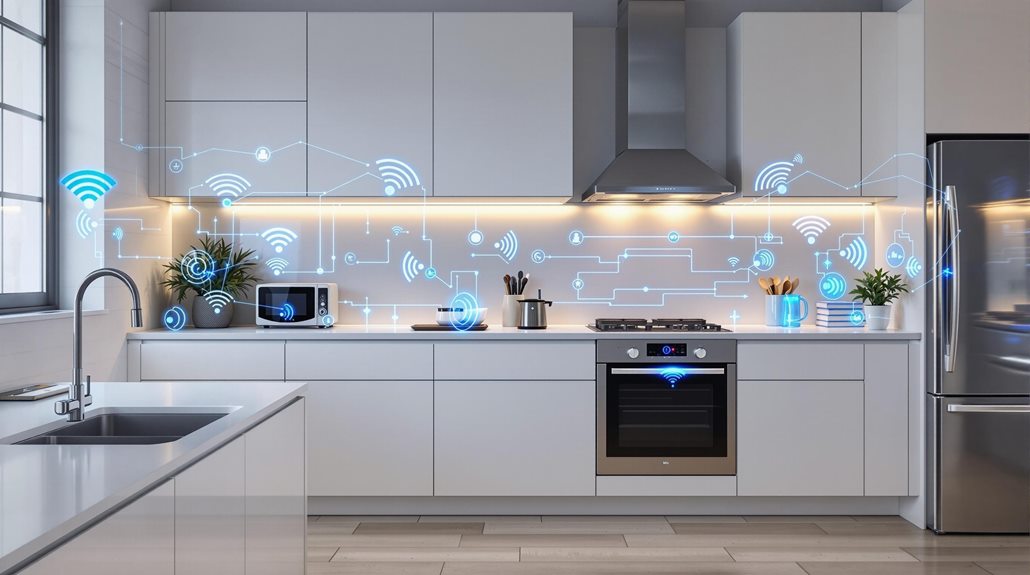
A sturdy network infrastructure serves as the backbone of any connected kitchen environment. To guarantee your smart appliances operate effectively, you'll need a reliable high-speed Wi-Fi network that can handle remote control functions and data monitoring. Your network should deliver at least 25 Mbps of bandwidth to support multiple connected devices simultaneously.
Strategic placement of your Wi-Fi router is indispensable for maintaining strong connectivity throughout your kitchen space. For mission-critical components like oven controllers, you might want to use wired Ethernet connections, which provide more stable and consistent performance than wireless alternatives. This dual approach ensures your smart kitchen remains operational even if one connection type experiences issues.
Don't neglect the importance of network security in your smart kitchen setup. You'll need to perform regular maintenance, install software updates promptly, and implement robust security measures to protect your connected appliances from cyber threats. Remember that each new smart device you add to your kitchen increases the demand on your network, so it's vital to monitor your bandwidth usage and adjust your infrastructure accordingly to maintain optimal performance.
Popular Smart Kitchen Features
Today's innovative kitchens come equipped with an impressive array of smart features designed to streamline cooking and food management. Smart kitchen technology has revolutionized home cooking by introducing intelligent kitchen appliances and devices that make your culinary experience more efficient and enjoyable. You'll find refrigerators that track your groceries' expiration dates and automatically create shopping lists, while smart ovens let you adjust temperature settings remotely through your smartphone.
These smart kitchen features integrate seamlessly with your daily routine, offering convenience and enhanced functionality. You can monitor kitchen activities from anywhere, receive notifications about your cooking progress, and guarantee safety with automatic shut-off capabilities.
- Voice-controlled faucets that dispense exact water amounts and temperatures
- Smart refrigerators with inventory management and recipe suggestions
- Connected ovens with remote preheating and temperature monitoring
- Automated coffee makers that brew your perfect cup on schedule
- Intelligent sensors that alert you about food freshness and cooking completion
Through smart home integration, these kitchen devices work together to create a more intuitive cooking environment. Whether you're a seasoned chef or casual cook, smart kitchen features help simplify meal preparation while maximizing efficiency and safety.
Future Of Kitchen Technology
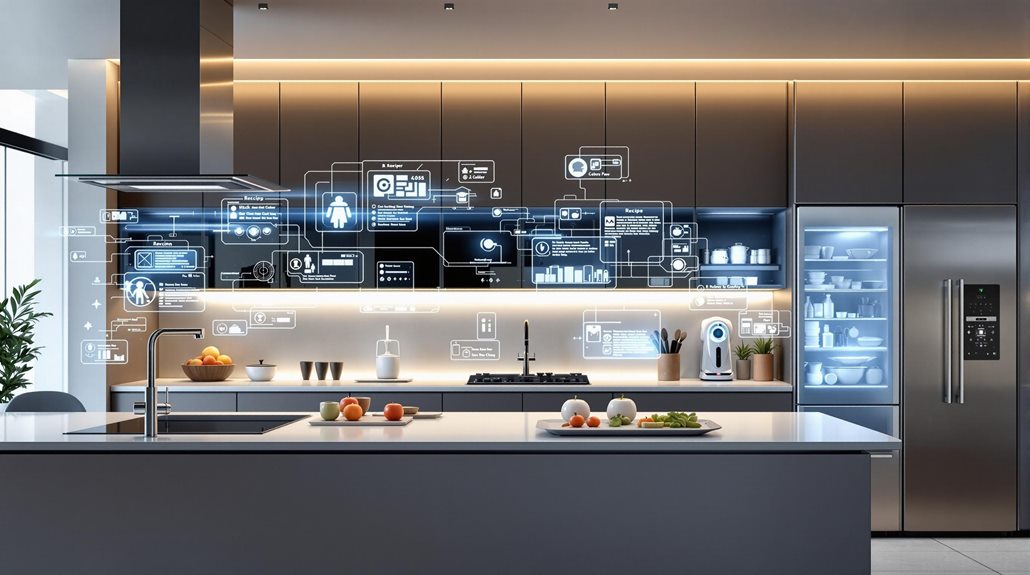
Innovation in kitchen technology continues to accelerate, with experts projecting the smart kitchen market to reach $76 billion by 2033. While smart features currently represent only 2% of the kitchen market, new developments are rapidly reshaping how you'll interact with your cooking devices.
The future of your home kitchen will focus on creating a more cohesive ecosystem through platforms like Matter and the Home Connectivity Alliance. You'll see better integration between different smart features, allowing Alexa or Google to seamlessly control multiple devices. As a home chef, you'll benefit from technology that serves as a culinary companion rather than just an automation tool.
Smart features will help you monitor food freshness and reduce waste through advanced refrigerator cameras, built-in barcode scanning, and intelligent expiration tracking. You'll also experience enhanced safety with integrated smoke detectors, carbon monoxide sensors, and automated leak detection systems. The kitchen of tomorrow isn't just about convenience—it's about creating an intelligent environment that inspires your cooking while keeping you safe. As interoperability improves, you'll spend less time managing technology and more time enjoying the cooking experience.


